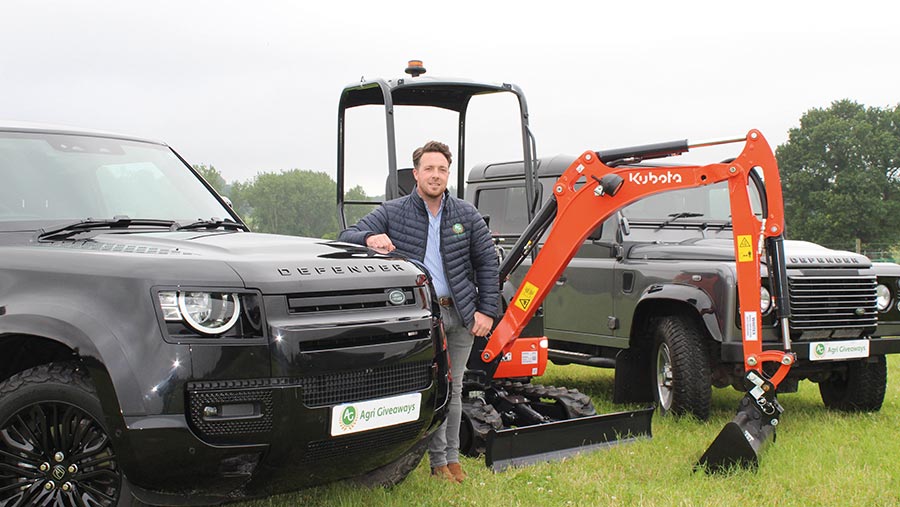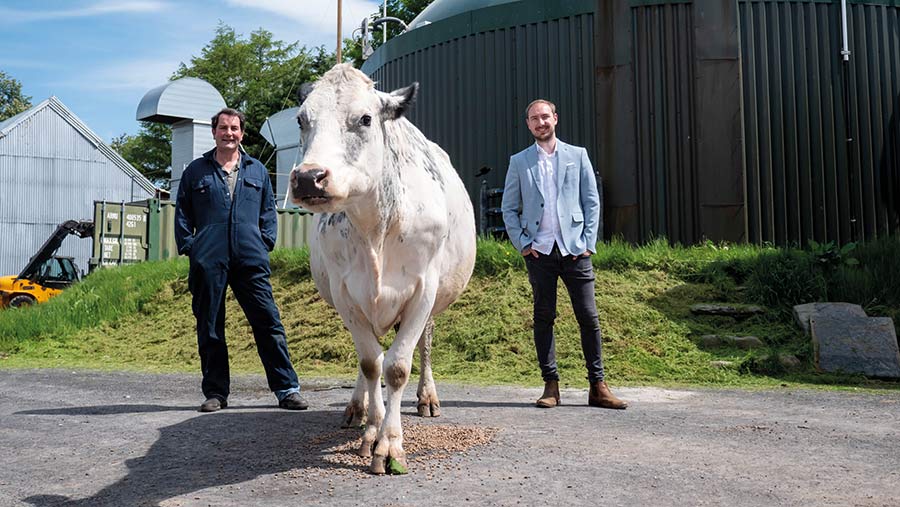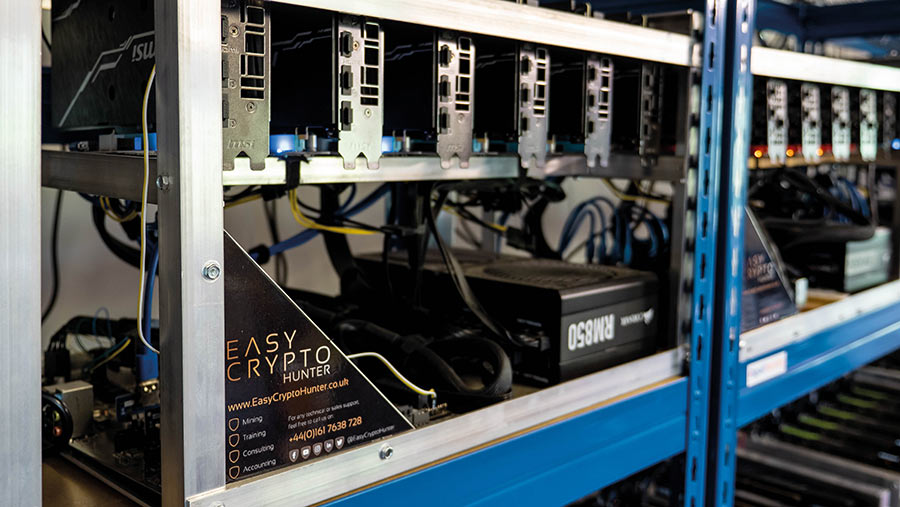Unusual farm diversifications help fill payments gap
 Sam Baggs runs the competition website Agri Givaways © Charlotte Callaway
Sam Baggs runs the competition website Agri Givaways © Charlotte Callaway Farmers are increasingly looking for novel ways to diversify to start filling the financial gap left by the loss of direct payments.
We talk to some who are carving particularly unusual niches, to show how out-of-the-box thinking can lead to tangible results.
See also: More diversification case studies and advice
Agri Giveaways competitions
Wiltshire beef and sheep farmer Sam Baggs has diversified into running a competition website offering people the opportunity to win prizes such as excavators, ATVs and Land Rover Defenders, as well as smaller bits of equipment such as pressure washers and tools.
The business, Agri Giveaways, was launched in February 2020 and has already given away prizes worth more than £2.5m.
The process begins with Mr Baggs buying the prizes – which tend to be a mix of brand new and second-hand equipment.
He then makes available a limited number of tickets for people who want to be in with a chance of winning each item.
Entrants can choose how many entries they would like to buy and once 50% of the tickets have been sold, a draw date for that prize is announced (normally the nearest Sunday).
The prize is drawn regardless of how many further tickets have been sold by that point.
Mr Baggs says people love the idea of taking part in a competition which is not going to break the bank, but offers a bit of excitement.
One of the major selling points is that only a limited number of entries is taken for each item, so everyone knows the odds.
For example, a recent Land Rover Defender competition was limited to a total of just 3,590 entries, each selling for £15.99.
All entrants have to answer a multiple-choice question about the item they are looking to win – which makes it a skills-based competition – and there is also a free postal entry option.
This means the business has not been required to apply for a gambling licence.
The draws take place live on Facebook, with Google’s random number generator used to determine the winner.
The business has about 45,000 followers on Facebook and it drives further entries by targeted advertising through social media.
From side project to major project
Mr Baggs says Covid has probably helped the business to grow because people have been at home so much, and he is now spending the bulk of his time running it.
“This has gone from a side project, into a major project quite rapidly,” he says. “It has been a huge part of the past 18 months’ income for the farm.”
One of the biggest challenges of running this type of business is choosing the right stock and getting the advertising right.
It is not without risk – there have been occasional items where he has not managed to cover his costs and so has made a loss. Online advertising accounts for about 10-12.5% of costs, and is getting more expensive.
“Anyone can put something online, but the trick is getting it in the right place to hit the right customer base,” Mr Baggs says.
However, the most rewarding part of the job is breaking the news to people that they have won. “That is the best bit – 99% of people are shocked,” he says.
Cryptocurrency computer power from the farm
If you want a diversification that doesn’t involve dealing with the public and requires very little time investment, Josh Riddett believes he has the answer.
Mr Riddett is the founder of Easy Crypto Hunter, a Manchester-based business selling high-spec specialist computers designed to crunch the numbers that allow cryptocurrency transactions to take place.

Farmer Philip Hughes, left, and Easy Crypto Hunter founder Josh Riddett © Jordan Harris
Cryptocurrency mining may sound baffling, but it effectively involves renting out computer power to companies that use blockchain technology so they can process transactions.
In return, the owner of the computer gets paid in cryptocurrency, which can then be converted to cash.
Bitcoin is perhaps the best known of the cryptocurrencies, but Mr Riddett’s machines are designed to mine smaller, less energy-intensive digital currencies including Ravencoin and Ethereum.
Most people choose to accumulate what they mine in the hope they can sell at higher prices in the future.
However, at current prices, Mr Riddett estimates that if a farmer chose to sell straight away, they might be earning £1,200 a month from a single “mining rig”.
Each mining rig – a powerful computer optimised for the task – is about the size of a small suitcase and costs £18,000 plus VAT.
The VAT can be claimed back and most farmers can usually claim capital allowances on the purchase.
Some clients are also able to claim R&D tax credits, although these are available to company structures only.
A 4G or satellite connection is usually sufficient.
The energy required to run each unit is about the equivalent of running a vacuum cleaner – but many people choose to operate multiple units, which means electricity bills can start to add up.
This is why it is a diversification proving popular among farmers generating renewable energy.
Welsh AD plant powers multiple mining rigs
Welsh milk producer Philip Hughes is one of these farmers, running multiple mining computers which he powers with surplus energy from his AD plant.
“AD is a 24-hour business and the rigs operate 24 hours a day, so it is a neat marriage between complementary technologies,” he says.
Some of the computers are his own, while he hosts others on behalf of third parties and charges them a rent.

The mining rig on Mr Hughes’s farm © Jordan Harris
No great technical knowledge is required to them set up, he says. “If you have a PC at home, that’s probably sufficient skill and training.”
However, he stresses the importance of the after-sales service he receives – which ranges from technical support to regular updates on which coins to mine.
“That is important, to partner with a company that is not just selling the equipment, but knows what they are doing to support it,” he says.
The value of cryptocurrencies can be volatile depending on what is happening in the world – geopolitical events and statements by key players in the market can have a big impact.
But Mr Hughes, who has been mining since March 2019, says he is looking at it as a long-term venture and is largely choosing to keep the coins he mines.
“It is rather like stocks and shares, and the day you sell them is really the day of reckoning to see how successful the project has been. While people do take money out monthly, I don’t think that is the majority of people’s attitude.”
How the cryptocurrency market will be regulated in future is one of the big unknowns, with the potential to have a significant impact on values.
But Mr Hughes says the rigs have alternative applications to mining. “People who are buying these bits of equipment could turn them to other uses,” he says.
‘Rent a tree’ schemes
Fruit growers are tapping into people’s desire to get more in touch with nature and improve their understanding of where their food comes from with a novel “rent a tree” scheme.
A number of producers in the south of England are operating schemes allowing members of the public to rent a cherry, apple, pear or cobnut tree for a season, giving them the right to harvest that year’s fruit for their own use.
The rent is typically £30-35 for an apple tree, rising to £45-£50 for a cherry tree.
Each participant is allocated a specific tree and will usually be invited to come and see it in the spring when it is in blossom and will be notified as the season progresses when the best time for harvesting will be.
Email updates detailing what is happening in the orchard and how the crop is progressing will be sent to customers. In between, the trees are managed by the grower.
The season ends with a designated period during which sponsors can visit to harvest the fruit, with guidance given on picking fruit safely.
